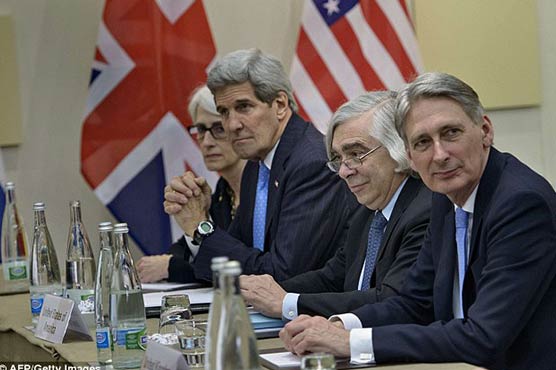Global powers to up pressure on Iran for nuclear deal

Iran and six world powers on Tuesday effectively gave themselves until Friday.
VIENNA (AFP) - European ministers were flying back to Vienna late Wednesday aiming to up the pressure on Iran to end a standoff over a nuclear deal in time to send it to US lawmakers.
German Foreign Minister Frank-Walter Steinmeier arrived ahead of his French and British counterparts, Laurent Fabius and Philip Hammond, who were also due to return to the Austrian capital during the night.
In a high-stakes game of diplomatic brinkmanship, global powers are chasing a deal curbing Tehran s nuclear ambitions and ending a 13-year standoff over suspicions Iran has sought to develop a nuclear bomb -- allegations it has long denied.
"It s doable by tomorrow night (Thursday) if talks advance this evening," said a Western diplomatic source.
Iran and six world powers on Tuesday effectively gave themselves until Friday to reach a deal by extending a November 2013 interim accord, after missing two target dates in this latest round of roller-coaster talks.
But under a new US law, if Secretary of State John Kerry fails to present the deal to Congress before the end of July 9 then lawmakers will have 60 days instead of 30 to review it, which may further delay its implementation.
Iranian President Hassan Rouhani expressed optimism however, saying his government is already preparing its economy for the lifting of sanctions.
"Negotiations with the P5+1 group are at a sensitive stage and the Islamic republic of Iran is preparing for (the period of) post-negotiations and post-sanctions," he said.
Rouhani made the remarks at Tehran s Mehrabad airport before flying to Russia to attend a meeting on Friday of the Shanghai Cooperation Organisation, which Iran has applied to join.
Work continued behind-the-scenes Wednesday to overcome the last few remaining differences, with the main accord and five complicated annexes mostly already written.
US Energy Secretary Ernest Moniz and Iran s nuclear chief Ali Akbar Salehi met twice for a total of three hours trying to hammer out details of what will be a highly complex accord, a US official said.
Iranians anxiously watching
In a sign of the rising tensions however, diplomats told of a stormy meeting Monday evening between Kerry and the foreign ministers of Iran and the other major powers that one senior envoy saw as a "very heated exchange of views."
Iranian media reported that Zarif told EU foreign policy chief Federica Mogherini: "Never threaten an Iranian".
During separate talks between Kerry and Zarif, other residents at the posh Coburg hotel heard shouting and raised voices, prompting a Kerry aide to poke his head round the door and advise the two to pipe down, a diplomatic source said.
Observers say it is hard to believe that after almost two years of intense and tough negotiations the talks could collapse.
Zarif said in an op-ed in the Financial Times that while a deal was "within reach", there was still no guarantee of success.
Back in Iran, Iranians are anxiously following the news out of Vienna, hoping for a deal that will end sanctions which have crippled the country s economy.
"It s important to get it done as soon as possible, because the longer it takes, the more money and opportunities we lose" to boost the economy, said Mohammad, a 31-year-old computer engineer from the northeastern city of Shahrud.
If a deal is signed and sanctions are lifted, "the situation will improve, wages will increase and there will be more jobs," he predicted.
Negotiations have stalled on how to ease sanctions against Iran, probing allegations that in the past Tehran did try to develop nuclear arms and ensuring Iran can continue to have a modest, peaceful nuclear programme.
Iran has also insisted there should be changes to a UN arms embargo and an easing of restrictions on missile sales.


